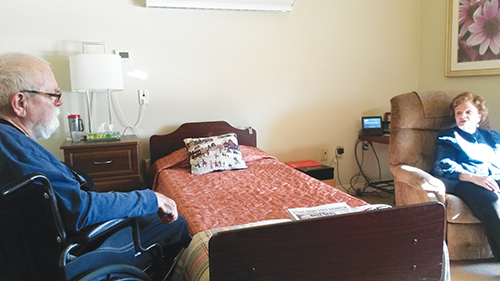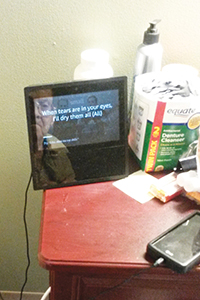By COLLEEN SCHRAPPEN
ST. LOUIS — John Pearman wants to hear one of his favorite songs. He cues up the 1st Generation Echo Show, a voice-activated smart speaker on his night table. "Echo, play 'Bridge Over Troubled Water,'" he instructs his virtual assistant.
Simon and Garfunkel croon as Pearman, 73, settles in for some easy listening in his cozy room at Ascension Living Sherbrooke Village, a senior community in a suburb of St. Louis. Pearman got the Amazon device in early 2018 as part of an Ascension Living pilot program.

Residents of Ascension Living Sherbrooke Village, a senior living community in suburban St. Louis, are piloting the use of voice-activated virtual assistants in their rooms. Galen Trammel, left, was eager to try the technology after a demonstration by his friend Eula Goff. Her Echo Show is on the table behind her. Colleen Schrappen/© CHA
"I initially pooh-poohed it," he says. But it didn't take long for him to be sold.
An Ascension staff member set up his device, which has built-in speakers and a 7-inch screen, and demonstrated the basics. "I just piddled around at first," Pearman says. "I listened to music from the '60s, '70s and '80s for hours on end."
But music is just one of the Echo's offerings. Introduced by Amazon in 2015, the gadget can read the news, answer questions and report the weather. Millions of U.S. households own one of its iterations.
The idea of offering voice-activated technology to seniors who grew up using rotary phones came from two members of the leadership team at Ascension Technology, the IT arm of St. Louis-based Ascension. Over a few days, they etched out a proposal for a proof-of-concept pilot and got it approved by Ascension Living executives. Within a month the demonstration to determine if the idea was worth advancing was up and running.
"We thought, 'This is a consumer product that is taking off with lightning speed.' We don't need to develop any technology. We can just take it and make it enhance (residents') lifestyles," recalls Angela Eckard, the manager of experience technologies at Ascension Technologies. "A product that you use in your home, it makes sense for (residents) to have it as well."
Good vibrations
One appeal of the Echo is its simplicity. Even for a generation that did not grow up with the Internet or cell phones, using the virtual assistant, colloquially known as Alexa, is intuitive.

Eckard
Last spring, the Sherbrooke program was rolled out to four pioneer residents — two in assisted living and two in skilled nursing. Each received an Echo Show. (Some residents who came into the pilot later use 2nd-Generation Echo Dots. Unlike the Show, it does not have a screen.) After four weeks, the team found that each resident was interacting with the Echo about 10 times a day.
"The feedback was that they really enjoyed using the devices," Eckard says. "They said, 'Hey, I love this. My grandkids are coming and showing me what this can do.'"
But for Eula Goff, who was in the pilot group, it was the other way around. "My granddaughter got one after I got mine," says Goff, 79. "I like it for music and the weather, and if you have a question, you just ask it. It's pretty easy. You just talk to it."
She showed it to her friends, including Galen Trammel. "I knew right away I wanted to try it," says Trammel, 84. "I like to play classical music. It's easier to get information, to stay up on current events."
Alexa, What's cooking?
With the success of the pilot, Ascension Living expanded the program throughout Sherbrooke Village and to its other St. Louis senior living facility, Lansdowne Place. Almost a quarter of the residents at the two locations — anyone who has expressed an interest — has an Echo in their rooms. The devices also incorporate "skills" — voice applications that are custom developed for residents — that include daily menus, recreation schedules, Mass times and the phone directory.
"It's a way to give information they are constantly looking for: what activities are going on today, what time their show is on," says Eckard.
Ascension Living also uses the Echo in community spaces, for interactive trivia games and dance parties. Staff members sometimes bring it into a resident's room for one-on-one time with an activities department staff member.

John Pearman is reflected in the screen of his voice-activated smart speaker as it plays the Simon and Garfunkel song he requested. Ascension Living, which has 54 senior living communities in 12 states and Washington, D.C. is testing the devices at Sherbrooke Village in suburban St. Louis to see if residents like the technology.
Colleen Schrappen/© CHA
"It's such a unique tool to bring residents together," Eckard says. "Some people think they could make you more isolated, but they've actually brought residents together in a unique form of engagement."
Potential medical applications
As Amazon continues to develop the technology, Eckard thinks its applications will expand to include the potential for medical care. If the Echo becomes HIPAA compliant, staff members could record their conversations with residents about their health needs, and that information could be stored on a virtual chart. Doctor appointments could be scheduled with just a voice trigger. Medication reminders could be set, and the Echo could be linked to the call-button service residents use for help.
Ascension safeguards against the risk that the device could be subject to data and privacy breaches by setting up all the devices on an Ascension account that is managed and secured by the facility and not linked to individual users.
A few other senior communities in the United States, including Aegis Living based in Washington state, the New Jewish Home in New York and California-based Front Porch, have been experimenting with Echos and other voice-controlled devices. At the University of Illinois, researchers have begun studying how seniors use the Echo.
Ascension Living, which has 54 communities in 12 states and Washington, D.C., is planning to expand the Echo program. Ascension's acute care facility at Saint Thomas Health in Nashville, Tenn., is in the middle of its own pilot. The cost is relatively low, with Echo devices ranging from under $100 to about $230 apiece.
"I think it's one of the best things we've ever done," says Linda Amoroso, Sherbrooke Village's director of life enrichment. "Ten years ago, we were excited we got laptops and could go into the room and show them the Web. But this is magic to me. They can do it on their own. People have someone to talk to in their room, but it's also great when they have visitors."